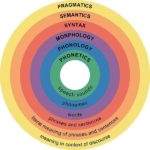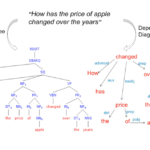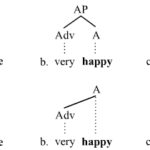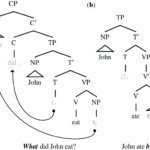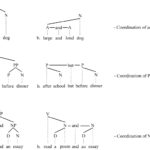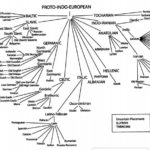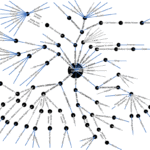not just a foreign-language elective, but the study of how languages are structured, including dialectology (Latin helps one decipher Romance languages, but linguistics helps one decipher all the others)
–
Table of Contents:
- Introduction
- Basics
- Vocabulary
- Progression
- Additional Notes
- Final Notes
- Overall (Images Begin)
- Sentence-component Trees
- Language-family Trees
- Videos
–
Introduction:
There were so many problems with the mix-and-match English language (such as how people were formally taught to write it; quotation marks after punctuation intended not for the quotations, etc.), that the language as a whole, not just the roots of its words, had to be examined and called into question. Since then, Inisfreeans have also reviewed other languages, determining whether they exist as originally intended, where they can be improved, and so on. The results have contributed to keeping the languages exclusively used by the Inisfreeans incredibly precise, consistent, and easy to understand (not just easy to convey ideas/commands in/through).
-
the scientific study of language and its structure, including the study of morphology, syntax, phonetics, and semantics. Specific branches of linguistics include sociolinguistics, dialectology, psycholinguistics, computational linguistics, historical-comparative linguistics, and applied linguistics.
–
Basics:
- systematic: characterized by order and planning
- phonetics: the branch of acoustics concerned with speech processes
- phonology: the study of the sound system of a given language
- morphology: the study of the structure of animals and plants –the branch of linguistics that studies the structure of words
–
Vocabulary:
- acronym: a word formed from the initial letters of several words
- affix: attach to –a bound morpheme that attaches to roots and stems
- allomorph: any of several different crystalline forms of the same chemical compound –a variant phonological representation of a morpheme
- allophone: (linguistics) any of various acoustically different forms of the same phoneme
- ambiguity: unclearness by virtue of having more than one meaning
- antonym: a word that expresses an opposite meaning
- blend: mix together different elements –a new word formed by joining two others and combining their meanings
- coda: the closing section of a musical composition
an optional element of a syllable, consisting of one or more consonants following the nucleus - compound: a whole formed by a union of two or more elements or parts –a word formed by combining two free morphemes in their entirety
- conjunction: the state of being joined together
- consonant: a speech sound that is not a vowel –formed by obstructing the flow of air as it is passed from the lungs through the vocal tract
- descriptive linguistics: a description (at a given point in time) of a language with respect to its phonology and morphology and syntax and semantics without value judgments
- prescriptive linguistics: an account of how a language should be used instead of how it is actually used; a prescription for the `correct’ phonology and morphology and syntax and semantics
- linguistics: the scientific study of language
- etymology: a history of a word
- semantics: the study of language meaning
- determiner: a determining or causal element or factor –a lexical category that co-occurs with nouns
- digraph: two successive letters –a spelling in which two letters are used to represent one sound
- diphthong: a sound that glides between two vowels in a single syllable
- homonym: a word pronounced or spelled the same with another meaning
- homophone: a word pronounced the same with another meaning or spelling
- inflect: vary the pitch of one’s speech –change the form of a word in accordance as required by the grammatical rules of the language
- morpheme: the smallest meaningful language unit
- orthography: representing the sounds of a language by written symbols
- phoneme: a distinct speech sound in a particular language
- phrase: an expression consisting of one or more words
- clause: a separate section of a legal document –an expression including a subject and predicate
- constituent: one of the individual parts making up a composite entity –a word or phrase or clause forming part of a larger grammatical construction
- rhyme: correspondence in the final sounds of two or more lines –a word or phrase or clause forming part of a larger grammatical construction
- schwa: a neutral middle vowel that occurs in unstressed syllables
- syllable: a unit of spoken language larger than a phoneme
- syntax: the study of the rules for forming admissible sentences
- synonym: a word that expresses the same or similar meaning
TBA: copy relevant parts from wiki
–
Progression:
- understanding how one’s own language formed
- understanding how similar/related languages formed
- understanding how differently-structured language formed
- understanding how a completely differently-structured language is likely to form
- practicing forming languages with different rules/branches that all those one is accustomed to using
- more TBA…
..
By School-grade:
- vocab’
- casual conversations using native languages, mixes of two languages (e.g. Spanglish), etc., to ease students into listening for similarities between them; probably shared root-words, root-syntax, etc.
- mouth and vocal chords structure of the different races/species compatible with us; the root of the range of sounds/letters of their languages/dialects
- numerous facts about the languages of everyone in the classes of this course
- students attempting to list all linguistics aspects/facts about an assigned (named) language foreign to them; seeing how much of its structure and roots they can note/guess/deduce
–and why some languages, and even the study of some aspects of linguistics itself / in general, were banned at various times by various groups; trying to prevent evolutions in ways of thinking/realizing, etc. - limitations of how each language/dialect is able to evolve (again, based on the structures of mouths and vocal chords, limiting different races to only so many possible ways of adding to their own language/dialect/s)
- causes of when the rate languages changed.. changed; when languages experienced less-frequent or more-frequent modifications/upgrades
(and maybe those changing rates were because those in control of those populations/languages at those times… wanted/needed more/less change/evolution, such as when trying to keep masses/workers focused on one vision as opposed to receiving/imagining the next) - how nonverbal languages changed; the linguistics that help us understand the development of the telepathic/visual and 3D/landforms-based languages of the ancients/gods
- teaming up to analyze recordings of small parts of dialogue/languages in order to determine first which type of language is being used (as opposed to year-5 work; when the language was named from the start, and only listened to a while in order to start listing heard/noticed aspects about it), then what other language/s it might stem from, etc.
- how not just speaking a language often/fluently, but studying the structure and links of that language, and learning linguistics in general, can affect the type of thoughts/thinking one has / defaults to
- brainstorming new forms of language which might come into being or be discovered in the vastness of The Abyss (Outer Space)
–and which languages, due to their structure/whatever, might become banned (by insecure/unstable Outlanders) in the future - prep’ for what landform-based and sky-/cosmic-based linguistics evidence/signs to look for during the upcoming exodus
- Exodus
- discussing how linguistics knowledge from this course was successfully applied last year
- meditating on ways to apply linguistics knowledge to forecast how best to maintain the intended structure of one’s own language/dialect
- senior project: presentation about how linguistics itself might evolve to better handle our growing awareness of all the forms of language; how the study of the way languages evolve… will itself be fine-tuned / augmented / amended, that its application better-aid us in sooner-understanding new revelations about the structures and relationships of known languages
–
Additional Notes:
Almost every language on Earth is structured similarly, if not identically; they have declaratives, imperatives, interrogatives, greetings, and just a few syllables/sounds to describe almost everything their people will ever encounter (or can think of). While different alphabets may make some more difficult to learn than others, they are all based on sounds, writing, and simple concepts. Therefore it is relatively easier to learn a foreign language, even if it uses a foreign alphabet and/or syntax, than it is to learn a language that, for example, might not use an alphabet at all; perhaps it is just sounds without a written form, or just geoglyphs never intended to be conveyed orally/verbally. That is where linguistics comes in; linguistics allows us to determine if we are even looking at a language in the first place, then how best to make sense of it.
…
2024 January: Regarding “Heir” and “Heiress”: It is not necessarily that a suffix was added to a male word to make it apply to females; it could just as easily be that the original word was for females, and got shortened to apply for males (a truncation). It would be interesting to examine languages, including no-longer-spoken (“dead”) languages, to see if any languages worked the other way around; if some languages actually had longer words to indicate application to males, adding suffixes to female words to make them male-applicable word-versions.
…
2024 July 1 and 2: Writing is VERY Distinct in the Different Ages
- The older the language, the more complete, the fancier its characters are, and the better it conveys more-complex ideas in fewer characters.
For example, modern human written languages have letters made from a few simple lines, and it takes many letters to form a single sentence,
but the written language of demons has characters which look more like overlapping calligraphy, similar to solar system describing sigils, and just one of them can encapsulate the entire essence and lifespan/forecast of the cosmic entity it symbolizes, so a sentence of multiple demonic written language letters would include complex information on the level of astrophysics and magic about numerous solar systems, sometimes even about how they interact with one another, as if a portion of the Periodic Table of the Elements, and multiple chemical equations based on that portion, had been converted into prose.
Somewhere in the middle is the math-based language of the Greys; its letter equivalents are the shorthand of the most complicated math equations, so even the name of one Grey alien is a sequence of such math ‘problems’/solutions –not easy for a human to fathom, and impossible to speak beyond telepathy with beings long-educated in all the higher mathematic disciplines.
At the far end of the languages spectrum is that of the celestials/gods/Valar themselves; its “letters” are entire universes from start to finish, if they have starts and finishes at all, thus it takes a 4D-seeing being at the least… to even be able to see their writing, and it can only be spoken by the deities whose nature is to speak/be it. When they speak, realities are formed from start to finish, and this doubles as their writing because it causes stars and planets to form. - “Sylvan” and “Sylph” sound very similar because they are closely related; they are both descended from Angels; silvery Elves, like the silvery light of the moons/Moon, and Air Elementals (typically the silvery-white of/like mild/gentle clouds).
- Gods don’t normally speak, for a single sound from them can end or begin or reshape an entire dimension/universe.
They don’t have to hold a vision, for perfect mental clarity and intension come naturally to them.
Their speech is all the sounds in the Universe, or the Universe is the spreading of their automatically-uttered vision, it becoming sound the moment they think or approve it. - Demigods might hibernate in petrified/stone form for millennia/eons, as their own voices, and even their thoughts when focused with enough intent/energy, can realign planets.
- Arch Elementals, such as the leaders of Djinn, or Pele, for example, have voices and wills which can cause volcanic eruptions, island formation, civilization destruction, and so on.
- Giants such as Atlanteans can cause nuclear blasts with their voices.
- Semi-giants such as ancient Aryans can hypnotize or drive into war frenzies lesser/mortal/average/modern humans.
- When a god speaks, it causes a reality to form or change/update, and all the stars, worlds, forces, and everything else in that reality is the writing that gets spoken into existence; gods don’t write separately from speaking. Also, a god exists in its own vision, voice, and writing; it is the realm it creates and adjusts.
..
When a demigod speaks, a world forms or updates; the worlds, or certain aspects of worlds, are their writing. Demigods might be the worlds themselves; petrified/hibernating Sphere Beings.
..
Angels, including Demons, cause changes of minds or lifepaths when they speak, so those new mindsets or lifestyles; individual developments, are their writing.
..
Ancient descendants of Angels, such as Elves, wrote with geoglyphs at first, even on the scale of building mountain ranges before they were ruined to look like they do today.
..
It is only the newest of peoples who speak and write separately, their voices barely audible or magical at all, their writing just ink on paper or pixels on a screen, and the reading of their writing rarely able to do anything other than trigger gibberish to be parroted by NPC-like fools ‘trolling’ / having adult-tantrums. - Modern human script (written language) is 2D; lines on paper or screen. We are 3D who make 2D things, such as what we see in our mind’s eye.
Aryan was slightly 3D; stone tablets and carved monoliths.
Atlantean was 3D; mega-structures such as mountain-size pyramids were their writing. Their step-pyramids represented the 4D evolution they could perceive at once, not just think about in parts like humans do today.
Lemurian was probably 4D; how the seas and oceans change throughout the Ages. Does that mean they were 5D?
Hyperborean might have been 5D; 4D in more than one timeline, and/or a dimension beyond time we are unable to truly understand/imagine. Maybe then they were 6D.
Polarian was all-D (is that 6D?); all time-spheres; all timelines of/in all universes/dimensions/realms. If they wrote in 6D, does that make them 7D (beyond / aware of all). - Some languages died (were ended/hidden) on purpose, vs being changed into newer forms; sometimes the ancients’ understanding of linguistics was such that they felt sure it was safer to prevent some powerful words/spells/sentences from ever continuing, let alone evolving into even more-powerful ones.
2024 July 22 Monday/+:
- The writing of the gods is the paths stars and worlds (and all other things) take.
To humans, only individual moments of that writing are visible. …Imagine if you could only see a single dot of ink that makes up a letter, therefore only able to notice a small portion of the gods’ writing; only that of as many moments as you lived through.
Extrapolating from that, …so many words, sentences, paragraphs, chapters, books, volumes, and more… are unknowable/unreadable by/to humans (and it is foolish to assume we can guess at them all, having not seen how dramatically they can change in times before and after mankind).
Maybe humans have only witnessed a single line of a single letter of the writing of the gods.
Maybe that is what one entire lifespan or universe timeline is to the gods; a single part of a single letter, not even a full sound, let alone a word/concept. - And then there is me; I not only can see the full script/story, I can decide what it is, what it was, and what it shall be. I can decide how it works. I can even decide whether the gods get to be part of it anymore; I have become the writer of this language –not just one who can write this way, but one who can decide how it is written.
- Humans tried making their own writing as a means of deceiving, distracting, tricking the gullible/ignorant into making themselves mortal via learning/believing it, but I sensed and tested and proved my way through that scam/evil, and only the weak fools/punks gravitated to that scam, thus it was a weapon that backfired on them, now always instantly revealing to me who is hopeless/evil/useless.
- Gaining this awareness/understanding/revelation is/unlocked one of the highest levels of linguistics.
- French is a language with a smooth, graceful, gentle sound, thus probably engineered that way by Angels, or descendants of Angels, to help those who heard it, like a lullaby/reassurance.
The fact that it is so misused today, like most other human/Earth languages I have learned about, is probably because the false humans (invaders/scum/parasites) always adopt parts of whatever they encounter, as their tactic for deceiving/luring innocents close enough to offend/hurt/abuse/trap them. - Human writing looks like ruins; lines/sticks randomly leaning together, not indicative of whole/stable ideas, just disconnected haphazard dangerous pokey blurbs. It is very crude, linear, barely connected, etc., just like how most modern Outlander humans kept self-defeatingly choosing to be. Languages tend to take on the personality of those speaking/writing them, not just the other way around. When people (such as humanimals) are too brainwashed/retarded/stupid/vestigial to learn, their language doesn’t shape/improve their consciousness/abilities; it is just something they mimic the intelligent use of, never actually growing/developing because of, or with, it. In those cases, the language itself ends up devolving/shrinking… until it, like its user/s, becomes nearly vestigial/pointless. When you learn other languages, be on the lookout for such signs; those are early warnings that can save you a LOT of trouble and heartache.
- The word “fruit” itself can be traced back to the Latin word “fructus”, derived from “frui” which means to enjoy or delight.
By the way, the word vegetable comes from the proto-Indo-European root word “weg”, which means strength or liveliness; those who first made that root-word (pun not intended) knew what was healthy; what caused/increased/restored strength/energy, and that was of course a vegan diet/lifestyle.
The feminine form of Jarl (his wife) would most likely be Frú, meaning Lady; not just generic colloquial “lady” (as in “any female/woman”), but a woman with high responsibility/status.
Curious, since “fruit” basically stems (another pun!) from a word nearly identical to the word for “lady”, and ladies are usually very refined enjoyable females; frui = “enjoy or delight”.
And the legend says that it was a Lady (Yavanna) who willed into being all the first plants/fruits.
“There are no coincidences.” - Look at which languages have confusing rules, double standards for spelling or punctuation (e.g. “read” in past tense is still “read”, but “lead” in past tense is “led”), and so on; maybe some languages were engineered to cause confusion and stress more than to communicate or help. Language can be weaponized or fixed… like anything else. It isn’t just individual words that can be misused (e.g. saying a racial slur to be funny, vs. saying it in an insulting way at a stranger just to make them feel uncomfortable), but the structure of language / entire language itself.
- Maybe the gods/Ainur don’t use their form of writing (dimensions, planets, etc.) to communicate to one another Or to us; they Need no communication, for they never grew apart, and they always had total telepathy and wisdom. Maybe their form of writing just happens automatically.
2024 September 13 Friday realization: This may mean that what they write (forming dimensions, stars, worlds, timelines, etc.) does not stem from a language that developed, and does not change how they think, but is directly from their thoughts; their telepathy causes and maintains the formation of such cosmic-scale things.
This reminds me of how the typist said that vampires cannot control their emotions, and how I thought maybe that’s because they were always so strong/powerful that they never had to. In this case, regarding their predecessors, it may mean that not only did the gods/goddesses never even think of controlling their emotions, maybe their emotions instantly manifest worlds/whatever just like their thoughts do, so every world/realm we see… is actually the physical form/equivalent of the thought/mood/s of at least one god/deity.
Their language, then, affects/shapes us / our thinking even more than our Own languages do. Interesting; a language that does not change the mind/thinking of the speaker/maker, but of those who hear/witness it / literally live on it.
The structure of the language of the gods never changed/developed, and was not developed; it simply is what happens when the gods think/imagine/desire. That structure, then, influences/regulates all other structures, linguistics-wise and everything else. - from Research Projects: 2024 September: Project Name: “Extrapolation from Ebonics”: Are all modern languages the failed attempts of the bad/false humans to speak languages which sounded far more eloquent, and had No weird rules, before the 1561 invasion? Maybe the same is true of modern religions; they are the failed attempt to understand and practice the real rituals/methods of the real humans whom the invaders could only incorrectly mimic. We now study whether there were more-logical rules / simpler (easier-to-understand and write) languages before that year, and how suddenly weird rules and bad speakers/writers came into being / become the modern Outlands norm.
- “The early Jazz musicians would say that a guy could really “blow” if he had a good sound when playing the horn. If he couldn’t play very well then they would say that he was “sucking” on that horn. That’s where the term “suck” as being something bad came from.”
So how did “blow” also become negative? Well, it branched into both negative and positive slang variants; the positive evolution is, of course, “blowjob”. - The main thing to understand about pyramids is that they don’t Have writing IN them; they ARE the writing; their structure/form/design represents mathematical relationships between parts of the Earth and more.
The writing IN the pyramids was added Long after they were built and left behind. That later writing was done by far more primitive beings, and is a completely different language, and conveys completely separate ideas. - Ba’al (meaning “lord”; ruler)… ball… planetary spheroid; no coincidences
..
2024 October 20 Sunday:
- Like learning Heptapod written language, learning languages we teach can eventually develop in the students some of the abilities of the races who invented these respective languages;
.. - learning Angelic helps with portals, being an omniglot telepathically, access to stars, and super-strength,
- learning Asari helps with diplomacy,
- learning Demonic/Infernal helps with receiving, processing, amplifying, directing, and flashflood-equivalenting human/Outlander emotions,
- learning Draconic helps with wielding time, not just traveling Through it, plus of course sensing and amassing/hoarding/stockpiling gems and gold which also help with such superpowers
- learning Drow and Dwarven helps with stabilizing and mining caves, among other things
- learning Eldar helps with terraforming and Webway navigation
- learning Elemental language/s help/s with wielding their respective element/s, of course
- learning Elven helps with manifesting and healing big plants, and crafting the finest textiles possible
- learning Fairy telepathy helps with manifesting and healing little plants, and using fallen plant parts for garments and camouflage/cloaking, such as in the legend of the gnomes who rubbed a kind of grass together to make themselves temporarily invisible to humans
- learning Gargoyle helps with self-petrification and de-petrification
- learning Kryptonian helps with mastery of many advanced levels of fitness and science, but not intensifying one’s gaze into lasers
- learning Majesdanian helps with bioluminescence and casting hard-light
- learning mermaid helps w/ underwater loud-voice, thus why these females are the best at singing even during storms, and to the point of nearly-instant arousal/hypnosis
- learning Pleiadian helps with switching one’s body and ship to thought mode, facilitating FTL and time travel
- learning Tamaranean helps with absorbing and casting solar radiation
- learning Thanagarian helps with reincarnation
- learning Vampire languages help with various clan specialties, such as blood magic and shapeshifting into bats or mist
- learning Werewolf telepathy helps with shapeshifting into wolf form
- and most of those languages help with levitation
- etc.
.. - Why? How? Because we end up manifesting more and more easily that which we speak and think of, especially once fluency and muscle memory are achieved, and the above-listed superpowers/abilities are foundational and frequent vocabulary and syntax in those languages.
.. - Me learning and teaching all these languages means I am destined to gain all their abilities stably.
.. - The gods’ thoughts/wills engineered those races And their languages, thus what abilities learning their languages can bestow, and which abilities are restricted to each intended race.
but I have made a race of my own, evidencing my god-blood, and have even instinctively written spells to fix the gods, or at least the human lies-spells about the gods, thus i am god of gods, my own language/thinking/nature/essence/calling being to wield the gods, not just one race’s superpower. - In this LHS Linguistics course, some classes discuss not only That this is the case/effect, but what exactly about the structure and development/engineering of those languages is Why it is the case/effect.
..
2024 October 21 Monday:
- Learning computer programming languages helps the student think and speak VERY precisely, starting with the basis/need for ensuring they don’t mis-type a single character, lest their line of code have a difficult-to-spot error which undesirably/unintentionally ‘calls’ the wrong ‘object’ (which could set off a horrible chain-reaction, thus the GUIs with color-coded lines-of-code ‘words’/types, and the hacking-like “testing to exhaustion/failure” in controlled (non-live/-public) ‘environments’ prior to publishing/using any such programs).
- Learning maths tends to trigger the student to much more easily anticipate financial and other numbers-based measurements and outcomes, particularly useful when dealing with investments such as stocks, and may even make it more likely for the student to manifest much more comfortable/substantial incomes / lucrative jobs (due to more-often working with larger numbers).
- Learning the sciences (arguably languages of their own) tends to trigger the student to see and manifest their local ‘world’ in a mechanical, reliable way.
–
Final Notes:
By understanding linguistics, not just languages, we can better decipher languages that are new to us. This goes beyond recognizing similar syntax; alien languages may not have any of the syntax we are familiar with at all (and some might not even have/need any (syntax) in the first place). To help us grasp what is being expressed to us in all languages, familiar/old and alien/new, we need to understand how and why all our known languages formed; it is in that… that we have our best chance of estimating which syntax/es are being used in any given language we have just encountered, as well as of estimating what sort of vocabulary/associations we are about to decipher/encounter (because some languages have no reason to describe plants, for example, if the language in question was developed to help machines on a world without any plants communicate with one another).
Furthermore, –and this is where it gets really interesting– understanding the principles of linguistics allows us to notice languages we might otherwise overlook, such as the one being used by the stars themselves to communicate with one another… and with the planets that orbit them… and with the stars their secretly-hollow cores contain. Languages often look/sound complex; they have many characters/letters/symbols (just count all the letters, numbers, punctuation marks, emojis, etc., in yours), such as Chinese (which has tens of thousands, a far cry from the few dozen English and most other languages use). To the untrained eye (or ear), our languages may seem like gibberish, …yet they have patterns, they develop in certain ways, and they have shown us that even a seemingly-random sequence of radio-bursts or other Morse-like emissions/transmissions… can be more than “background noise/static”; it can be the reading of a speech or full novel.
–
Overall:
–
Sentence-component Trees:
–
Language-family Trees:
–

–
Also see:
- This Culture That Came BEFORE the Native Americans
(minus the evil-tarded xian comment at end) - Michael Armstrong – “Night Linguistic = No + Eight” – Thunderbolts
Night = no+8
..
Noel = No El; absence of Elohim/God/s when Saturn and Venus no longer lighting Earth, causing a lasting darkness
–
